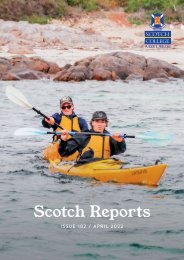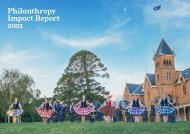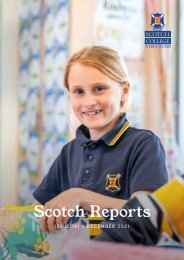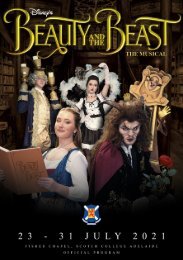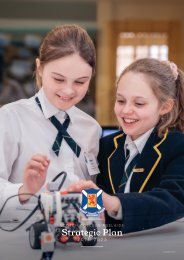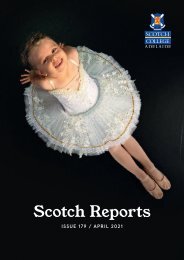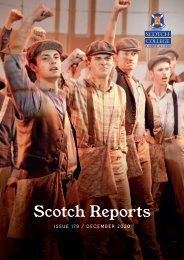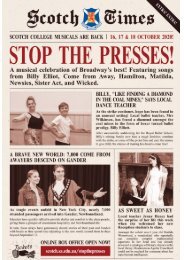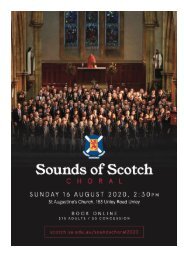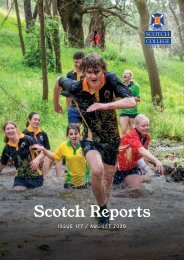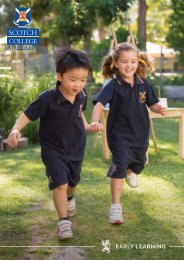Scotch Reports Issue 174 (April 2019)
In the first edition for 2019, we hear from Dr Newton, each of our Scotch campuses, plus a Scotch story from Andrew Saies and all of the Class of 2018 results and destinations. There are also articles from Head of Community, Natalie Felkl and a bumper Straight Scotch covering all things OC and a look back on 2018 OC reunions.
In the first edition for 2019, we hear from Dr Newton, each of our Scotch campuses, plus a Scotch story from Andrew Saies and all of the Class of 2018 results and destinations. There are also articles from Head of Community, Natalie Felkl and a bumper Straight Scotch covering all things OC and a look back on 2018 OC reunions.
You also want an ePaper? Increase the reach of your titles
YUMPU automatically turns print PDFs into web optimized ePapers that Google loves.
EARLY LEARNING CENTRE<br />
ELC Literacy and Numeracy<br />
An article in the SAGE Handbook of Early<br />
Childhood Research summarises what<br />
research tells us about early human<br />
development and the importance of the<br />
environment to early life.<br />
1. Coping abilities, cognitive and noncognitive<br />
competencies, and skill<br />
formation are influenced by genes and<br />
early life environments and experiences.<br />
2. The foundation for later learning<br />
is formed in early life experiences,<br />
such that the development of neural<br />
pathways and the mastery of skills occur<br />
‘from the bottom up’.<br />
3. Cognitive, social, emotional<br />
and language competencies are<br />
interdependent, and all are shaped by<br />
early experiences.<br />
This summary clearly demonstrates that<br />
an investment in high quality education for<br />
children in their early years is a prudent<br />
investment in their future. The experiences<br />
that children have in their early years<br />
lay the foundations for learning later in<br />
their schooling. Hence, one of the most<br />
important decisions that parents make<br />
about their child’s education is where they<br />
begin their educational journey.<br />
Our play-based environment provides a<br />
rich base for children to develop early<br />
Literacy and Numeracy understandings,<br />
which will underpin all learning for these<br />
children in the future. Here is a snapshot of<br />
what Literacy and Numeracy look like every<br />
day in our 3 and 4-year-old classrooms.<br />
TANIA DARLING<br />
Director of Early Years<br />
LITERACY AND NUMERACY IN<br />
3-YEAR-OLD LEARNING<br />
While numeracy learning is always<br />
occurring, the educators in the Fraser<br />
room extend and challenge children’s<br />
understanding by supporting and extending<br />
them through the intentional and focused<br />
use of numerical language. With targeted<br />
Numeracy focus areas each term,<br />
educators consistently model focused<br />
mathematical language that is relevant to<br />
3-year-olds and their world.<br />
Literacy is at the heart of learning in the<br />
Fraser Room. Through play and intentional<br />
learning experiences, children build oral<br />
and written communication skills. Literacy<br />
learning for 3-year-olds occurs when<br />
children sing songs, share ideas, question,<br />
predict, decode pictures, negotiate, copy<br />
words and sounds, recognise their name,<br />
develop a love for books and describe<br />
their learning.<br />
The Fraser children have a keen, ongoing<br />
interest in planting and caring for<br />
vegetables in the Fraser garden. This has<br />
been an ideal opportunity for educators<br />
to support the children to extend their<br />
literacy and numeracy learning through<br />
play. For example, reading books linked to<br />
children’s interests fosters sharing ideas,<br />
a developing love of books, letter, sound<br />
and word recognition. The responsibility<br />
of watering the garden supports children’s<br />
negotiation skills and builds their idea of<br />
time and routine. While observing and<br />
investigating our produce, children are<br />
predicting, counting, exploring pattern,<br />
noticing number, observing shapes and<br />
questioning their theories and ideas.<br />
LIA VAN DER PENNEN<br />
3-year-old Teacher<br />
8




